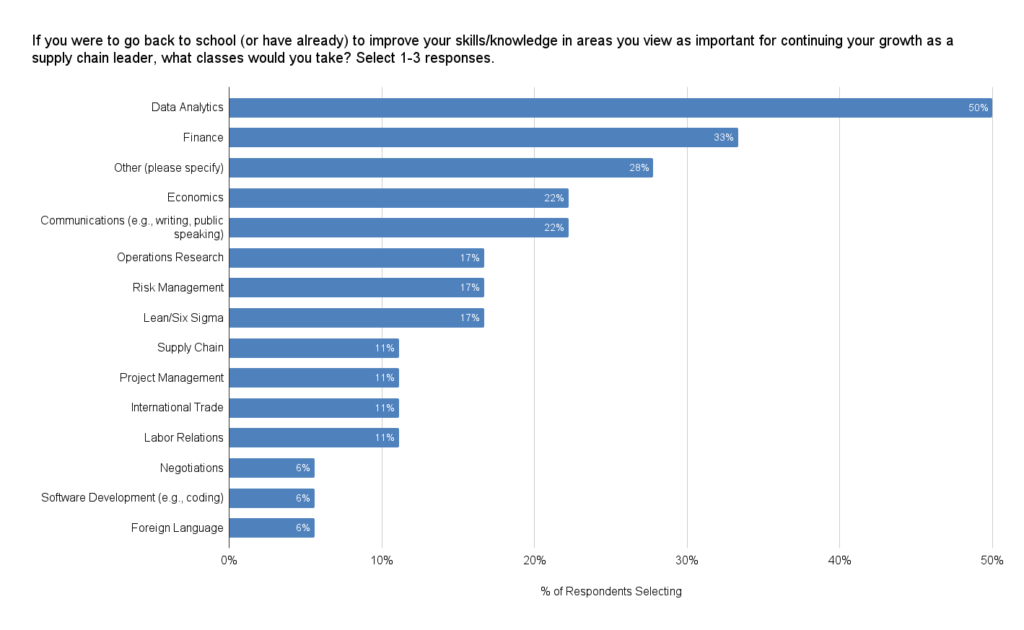Are your kids interested in learning about supply chain management? Are any of them pursuing (or have gotten) a degree in the field?
In my case, my kids have certainly become more aware about supply chain management since the pandemic, but none of them (so far) have pursued a degree in it.
My two oldest kids have graduated with Electrical Engineering and Computer Science degrees, and my youngest son is pursuing a degree in Mechanical Engineering. My youngest daughter, a rising junior in high school, will likely break the engineering streak, but I’m not sure supply chain management is on her list of academic interests. I’ve got two years to work some magic.
That said, as Paul Page wrote in the Wall Street Journal last week, there have been “thousands of students drawn to supply-chain management studies by the turmoil that hit communities and businesses when the Covid-19 pandemic starting in 2020 upended global supply chains.” According to the article:
Established supply-chain programs such as those at Penn State, Michigan State, the Georgia Institute of Technology and the University of Tennessee say they have seen students coming out of high school with their interest already piqued by the pandemic-era shortages of everything from food to paper products.
[These] students make up a new generation whose views and aspirations were formed by the television coverage, social-media posts and dinner-table conversations about empty shelves, lengthy supermarket lines and historic shipping backups. Some just started college while others went back to school in the midst of careers in other fields, some of them sent by companies to bolster their own supply chains.
It’s been a long time coming.
More than 13 years ago in “A Farm System For Supply Chain And Logistics: Preparing The Next Generation Of Leaders,” I argued that we needed to create greater awareness, interest, and excitement about supply chain management and logistics among high school students, as well as teachers and guidance counselors. In short, we needed to create a farm system, like in baseball, to attract and develop the next generation of supply chain management leaders.
Then in 2020, during the pandemic, we asked members of our Indago supply chain research community — who are all supply chain and logistics executives from manufacturing, retail, and distribution companies — if their local high schools offered a supply chain management course or program. The vast majority of our respondents (90%) said that their local high schools either did not offer a supply chain management course or program (45%) or they did not know (45%).
We also asked them, “Do you agree or disagree that high schools should offer a course on supply chain management?” Almost three quarters of the respondents (74%) agreed or strongly agreed that high schools should offer a course in supply chain management, with only 6% disagreeing. For additional insights from the research, please see “Supply Chain In High School.”
Back to the WSJ article, I saw an early sign of this interest in supply chain management among high school students when I received the following email from such a student in March 2022:
I am a student who wants to get into the supply chain field. I have been accepted to both Michigan State’s and Arizona State’s supply chain programs, but I think a smaller, private school could be a better fit for me. If I went to a smaller, private school, I would graduate with a Business Administration degree, not a degree in Supply Chain Management. I am trying to weigh these factors, so I wanted your opinion on two things regarding students looking to go into supply chain management. First, how important is the type of degree for job applicants in the supply chain field? Second, how important is the school where you graduated from?
I shared my thoughts on his questions, along with some related Indago research results, in “Questions From High School Student Interested In Supply Chain Management.” Paul Page also shares some perspective on the student’s question about job prospects: “The U.S. Bureau of Labor Statistics counted more than 200,000 jobs as ‘logistics’ in 2022 and projected hiring would grow by 18% over the next decade, far beyond the average 3% growth in all job categories.”
It’s important to note that the learning never ends in supply chain management, even when you’re a seasoned executive. Last August, we asked our Indago members, “If you were to go back to school (or have already) to improve your skills/knowledge in areas you view as important for continuing your growth as a supply chain leader, what classes would you take?”
Half our member respondents (50%) said they would take a “Data Analytics” class to continue their growth as supply chain leaders. Second on the list was taking a “Finance” class (33%).

For additional insights from the research, see “Back To School: Classes Supply Chain Leaders Should Take.”
My youngest daughter is away at summer camp, but I printed out the WSJ article and put it on her desk for when she returns. I put a sticky note on it: “Something to think about.”
I also forwarded it to my older kids, the engineers like their father, because like so many current supply chain professionals (including me), they might fall into this industry later in life too.










